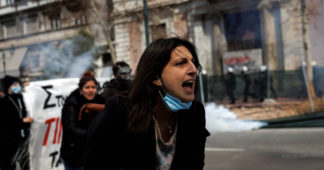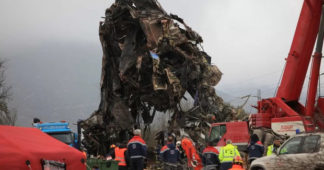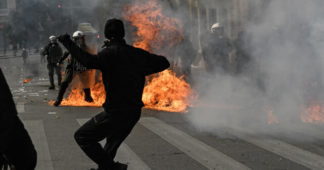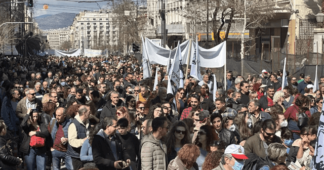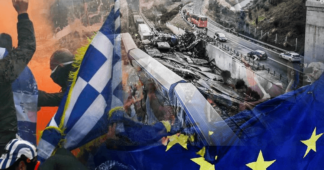Last week, two trains collided in central Greece, claiming 57 lives. Unions had long warned that cuts to the now-privatized rail network would cause a severe accident, but neither the government nor the country’s corporate media heeded the calls.
By Matthaios Tsimitakis, Mihalis Panayiotakis
Mar 8, 2023
The collision was one of Europe’s deadliest rail accidents in a decade. The passenger train was traveling at 160 km/h when it collided head-on with a cargo train moving at 110 km/h. The force of the impact generated temperatures high enough to melt steel. It is unlikely that some victims’ remains will ever be retrieved; others will only be identified through DNA testing.
Now millions in Greece are asking: How was it possible that two trains could travel for all of twelve kilometers on the same railway line, in opposite directions, without anyone noticing? Why weren’t telematics or other safety measures in place?
Worker Unions Rang the Alarm
There were plenty of indications that a severe accident was around the corner. Greece’s railway unions predicted the accident in advance, weeks before it happened. A series of union notices publicly warned of danger. In an official notice sent on February 7 to the Hellenic Railways Organisation (OSE), unions described the state of disrepair on the railway system and warned management of forthcoming industrial action: “We are not going to wait for the coming accident to see them shedding crocodile tears and making declarations.”
In April 2022, the head of ETCS (the European Train Control System) resigned over concerns for the security of the carriers and the public. Nonetheless, the mainstream media, complicit in the tragedy, ignored all the alarm bells.
According to the railway company’s own organizational chart, there should be at least two thousand workers employed to maintain standards. At the time of the accident, however, there were less than seven hundred fifty.
Three similar accidents on the same route had already occurred in 2022, though without any fatalities, and there have been thirty-seven safety incidents in total during the past ten years. Last week, the European Commission referred Greece to the European Court of Justice for failure to comply with the rules of railway transport.
The Root Causes
Since the Greek bailout, a consistent feature of conservatives has been the demonization of the unions. Once it came into government, New Democracy passed an anti-labor law that made most strikes illegal, gagging workers’ efforts to sound the alarm about railway safety.
Prime Minister Kyriakos Mitsotakis’s government boasts that it is modernizing the state through the (belated) introduction of digital systems and the opening of markets through deregulation. One of the main pillars of the National Recovery and Resilience Plan, funded by the EU with billions of euros, is the digitization of public services.
But thanks to an ongoing cut to the workforce, Greek train engine drivers remain overworked and dealing with old equipment, poor safety measures, and only makeshift interpersonal communication.
These outdated and unsafe conditions are the product of neoliberalism. They are the result of a program that invests in the bankruptcy of public assets, only to reintroduce them as private monopolies, while it guarantees political support through clientelism and neglect.
Except for the single line that connects the two major cities in the north and the south, railways have never been a significant part of Greece’s transport system. Railway privatization, a bailout obligation imposed by the infamous troika of lenders more than ten years ago, led to a split between railway infrastructure companies and rail service providers. Contrary to the expansion of the railway network across Europe and the introduction there of upgraded safety measures, the Greek railway network actually shrunk.
The government retained the infrastructure management through the state-owned company, OSE, ensuring that the public monopoly of passenger trains became a private one, sold to the Italian state-owned company Ferrovie dello Stato. The negligent management of OSE made a bad situation worse by avoiding its responsibility to maintain public infrastructure.
In a frenzy to privatize public assets and outsource services through public-private partnerships and contractors, the conservative government refused to hire enough railway workers to balance the number of workers retiring in the OSE workforce. This resulted in a railway system bereft of basic safety mechanisms. According to the stationmaster of Larissa, a telecommanding center that guaranteed the safety of trains, operated until 2019 when the left government of Syriza lost the elections.
On top of all this, there is also political corruption. The stationmaster, blamed for the tragedy, was hired as a temp, allegedly with the intervention of a high-ranking New Democracy cadre. He was trained quickly and allowed to manage the tracks without any backup or monitoring.
By 2010, the debt of OSE reached €10 billion or 4 percent of the Greek GDP. By 2013, nineteen contracts for the installation of signaling systems had been awarded for a total value of €460 million by the European Commission. However, none of these work in critical parts of the network like the Vale of Tempe. Between 2018–20, Greece had more deadly railway accidents per kilometer traveled than any other EU country.
Shock Doctrine Once Again
Since the Tempe accident, there have been large-scale protests in Greece, and the usual presence of riot police, tear gas, and police brutality. Nonetheless, the protests continue to grow, signaling a new era of social tension and upheaval.
Twelve years after the bailout of the Greek economy by the troika of lenders, a great part of Greece’s public infrastructure has been sold off, both to European public or private companies and, further afield, to Chinese state companies. The rule of law and the overall function of institutions is so degraded that it is now questionable if it meets European standards.
The judiciary, increasingly delegitimized in public perception, is under EU scrutiny as to its independence, while mainstream Greek media is under the control of government-friendly oligarchs, or otherwise bribed into submission. Greece, according to RSF rankings for press freedom, is in the 108th position; it is the least free of all EU countries. Crises are stacking up in Greece but lacking a rigorous media, the casualties produced are being publicly reported as a kind of natural phenomenon. There was nothing natural about the thirty-five thousand victims of COVID-19 who died because of the disrepair and understaffing of the health care system.
Greece is still undergoing neoliberal shock therapy. In the midst of the COVID-19 emergency and after the end of the bailout agreements in 2018, it has continued unabated. Tellingly, in the aftermath of the train disaster, the government moved to introduce two bills: one for the privatization of the only children’s cancer hospital in the country and the second to introduce a first step for the privatization of the water service.
With legislative elections due in July this year, the Greek electorate is being asked to vote for another four years of neoliberal shock and awe. Opinion polls predict another New Democracy victory, but in the light of the latest tragedy, such an outcome now looks less likely.
We remind our readers that publication of articles on our site does not mean that we agree with what is written. Our policy is to publish anything which we consider of interest, so as to assist our readers in forming their opinions. Sometimes we even publish articles with which we totally disagree, since we believe it is important for our readers to be informed on as wide a spectrum of views as possible.
